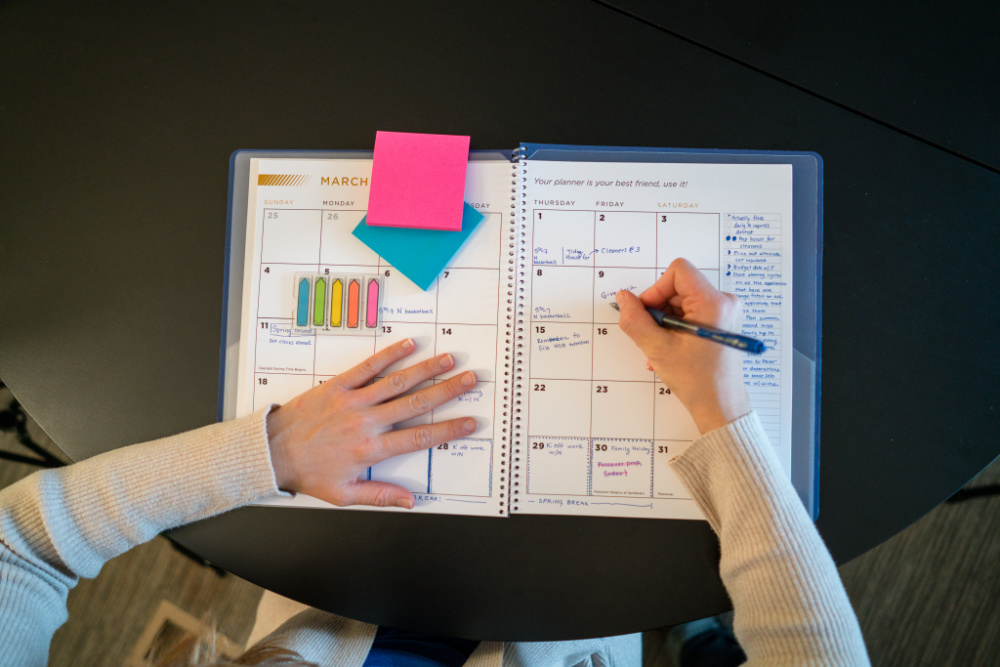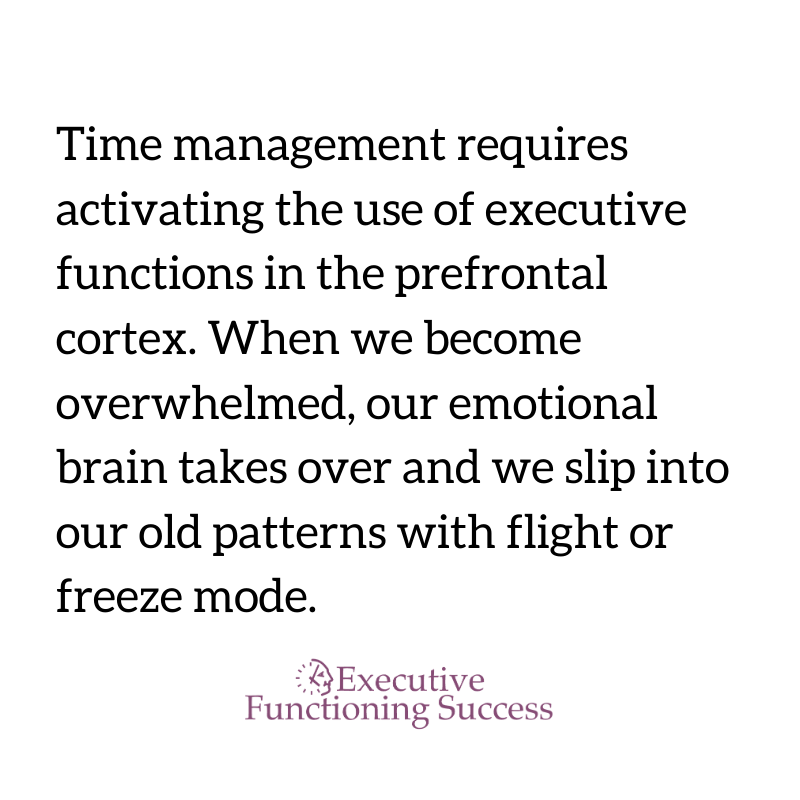
Routines Lighten the Load for your Brain’s Executive Functioning
Many of my clients, especially those with ADHD, have such a hard time getting started in the mornings. Their internal voice is giving them a huge list of To-Dos, and whatever comes into sight around them provides more distracting demands.
Faced with overwhelming choices, many folks don’t get started first thing on anything important. They may bounce from task to task, not completing anything. They forget all about time management. Exhausted, they often take the easy way out: by escaping into the comfortable distractions of the digital world.
You see, time management requires activating the use of executive functions in the prefrontal cortex. And that takes effort. Multiple choices can overload our poor brains with the demands of making decisions. When we become overwhelmed, the emotional brain takes over and we slip into our old patterns with flight or freeze mode. Prioritizing tasks becomes incredibly overwhelming.
It was a high school client who helped me zero in on the problem for so many of us. After a few weeks in my Seeing My Time course, she shared a personal revelation. Online learning was really hard because she missed the predictable routine of going to school. Pre-pandemic, the patterns of her day were clearly scheduled. She didn’t have to make choices. Without that predictability, she was lost and floating through the day and through time.
The key word she used was “routine.”
The wonderful aspect of having routines is that we don’t have to think or make any choices. When we have a predictable schedule, we are engaging a different region of the brain which takes the pressure off of the prefrontal cortex. One big challenge of the pandemic has been this disruption to our routines!
When Routines are Sabatoged by Outside Forces
 We all have daily patterns, things we unconsciously do. Sometimes these serve us, and sometimes they do not.
We all have daily patterns, things we unconsciously do. Sometimes these serve us, and sometimes they do not.
A private adult Seeing My Time client has a habit of always checking his phone after he climbs into bed. Before he knows it, he gets sucked into the “digital canyon” and then does not get enough sleep.
His morning routine is similar. Before getting out of bed, he checks his phone again, getting lost in emails and news feeds. This repeated act eats up valuable time. Suddenly he is rushed and overwhelmed as he gets his workday started. As he and I examined his daily routines, he concluded that he should recharge his phone at night in another room to set up a new plan that is healthier and better for his brain and his time management.
It’s very common for our plans to be waylaid by these outside forces that grab our attention. In order to stay on track, we need routines that support the brain. So how to set up these supportive habits? First, we must look closer at our routines and analyze them.
How I Changed My Morning Routine
Many experts stress that it is really important to start with intentional morning activities, which sets the stage for the whole day. That sounds great, but how do you do all of the things they advise, like exercising, improving your mind by reading, eating a brain-friendly breakfast, and still avoid creating more clutter by dumping breakfast dishes in the sink because you are late for work or school? Ahhhh!

A positive morning routine sets the tone for the day!
I faced this dilemma when I decided that a personal goal for 2021 is to read one professional development book each month. To do that I needed to schedule 30 Minutes, 5 days a week to read and take notes. My morning schedule was already full and so was my workday. By evening my brain is mushy and useless for learning. If I was to read, and more critically, to remember anything that I had read, this learning time had to fit into my morning routine. How?
When I really analyzed my morning activities, I realized that the key to a successful morning was actually dependent upon my evening routine! What I did before bed was critical to support the following day. In a nutshell here is what I discovered:
- Tidy up the kitchen, dining room, and living room after dinner. Even an exhausted brain can manage to tidy up. When I do that, I avoid the distraction and stress of the need to tidy up before I begin work in the morning. That morning tidying up was using valuable time when my brain actually functions quite well and is better suited to more demanding mental tasks.
- Go to bed earlier! Yeah, I know, this is tough when we have other activities that keep us up late. But, I’m here to tell you, that with some conscious effort, I’m now getting to sleep a full hour earlier! That is giving me valuable time for sleep, which gives me energy for the next day’s plans.
- Make sure that I have a written plan for the next day. Writing things down on my day plan the night before helps me set the routine for tomorrow. By writing down exercise, daily reading and the time I am turning out the lights for bed, I exponentially increase the odds of actually following my goals. Setting an intention for the day ahead helps solidify it into my consciousness and helps me wake up with that feeling of intention and awareness.
Those three changes in routine have allowed me to spend quality time reading and learning. I get so excited about what I am learning. My brain is happily building new dendrites. I share my new insights daily with my clients. It is an awesome way to start my day.
I invite you to pause and look at your own evening and morning routines (or lack thereof?). Pick something that you are highly motivated to add to your morning habits. What can you do the night before to set up your successful morning? You CAN improve your routines!
Little by little…Marydee
PS: If you are looking for a system for prioritizing your To-Do list, making your plans visible and keeping them in sight and in mind, the Seeing My Time Adult Planner System and Mini-Course can help! We are still printing shipping out January 2021 – January 2022 planners!
About the Author Marydee Sklar
Marydee Sklar is the president of Executive Functioning Success and the creator of the Seeing My Time Program® and the Set Up Success and Seeing My Time® planners. She is an educator and author of three books on executive functions, as well as a trainer and speaker. Marydee has more than twenty-five years of experience working with students and adults with executive function challenges.
Related Posts
12 Executive Functions of the Brain Spotlight: #7: Sustained Attention
Stress Tolerance as a New Executive Function: Musings from Marydee
12 Executive Functions of the Brain Spotlight: #5 Task Initiation
12 Executive Functions of the Brain Spotlight: #4 Prioritization
